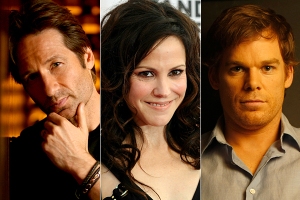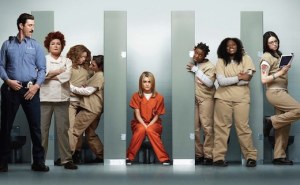According to the Merriam-Webster Dictionary, an antihero is “a protagonist or notable figure who is conspicuously lacking in heroic qualities.” Urban Dictionary takes this definition one step further, claiming that an antihero is “a flawed hero, and therfore (sic), much more intresting (sic) then (sic) the more traditional heros (sic).” Don’t worry. You haven’t stumbled onto a transcript of a graduation speech. I just want to make sure you know what I’m thinking about when talking about antiheroes. I’ll try to refrain from too many definitions going forward.
Why are people so drawn to antiheroes? Are they, as Urban Dictionary claims, more interesting than traditional heroes? What is it about antiheroes that have audiences coming back season after season to see what happens to these characters? I think it’s because it’s a little easier to relate to them. We’re not all girl scouts who spend our time selling cookies and helping little old ladies across the street, so it’s hard to imagine living that life. But, when push comes to shove, would we be willing to sell marijuana so that our kids might live the life that they were accustomed to before their father died, like Nancy Botwin of Weeds did? Or how tempting is it to escape a high-stress life of saving lives by popping pills like Jackie Peyton on Nurse Jackie? And, just so I can get away from the drug references, just what would you be willing to do to survive and even raise a family as a KGB agent in 1980s America like Elizabeth Jennings/Nadezhda in The Americans? Probably a lot of things you might not be proud of.
But where the heck are all the female antiheroes on TV? Maybe they’re hiding out on BBC or somewhere else, because they certainly aren’t being shown on American stations. Or maybe many of them are just on Orange is the New Black (Netflix), but I’ll get to that.

There’s Dexter Morgan (Dexter, Showtime), Ray Donovan (Ray Donovan, Showtime), Gregory House (House, M.D., FOX) Tony Soprano (The Sopranos, HBO), Don Draper (Mad Men, AMC), Walter White (Breaking Bad, AMC), and countless other male antiheroes on television. Those were just off the top of my head and I don’t watch many of those programs. When researching for this article, I struggled to find just a handful of women that could be considered antiheroes. Is it because, as Alyssa Rosenberg claims in this article, women “get penalized rather than rewarded for displaying masculine traits like aggression, physical force, ambition, or selfishness”? Can people really not appreciate a woman who is so driven that she is willing to abandon traditional “feminine” values to pursue her goals? I agree with some of what Rosenberg is saying but I have trouble with the idea of forgoing attempts at creating female antiheroes in favor of creating an entirely different genre or way of storytelling to explore what it means to be an American woman for many of the same reasons that I’m not comfortable as a female comic book fan when people like Mark Millar and Todd McFarlane are trying to tell me that comic books aren’t for women. Why can’t I have a female antihero on TV? Why can’t I expect to be catered to as a female comic book fan? Heck, why can’t I, as a female gamer, have video games sold to me?
There’s this ingrained idea that there is certain entertainment for men and certain entertainment for women and that, if there is any crossover, it’s usually still mostly designed for the men but with “girly” stuff thrown in for the ladies. Debra Morgan is Dexter’s badass sister but she’s still an emotional basket case while her brother is cool, calm, and murderous. Dexter’s foil for much of season 6 and some of season 7, Hannah McKay, is also a killer but she’s irrational, succumbs to emotion, and more in love with Dexter than she is with killing. She could have been his equal in many ways but she’s portrayed as weaker because her love for the main character is her biggest defining trait. These two women are huge parts of Dexter’s life but they serve not to empower the roles they play but rather to support Dexter’s role as antihero. Deb could very easily have been setup to be Dexter’s partner but because she displays discomfort in his urges, she’s more of a burden than an ally most of the time. The women in his life are simply not strong enough to bear the cross of his serial killing, it seems.
Weeds ran alongside of Dexter for quite some time on Showtime. Its main character, Nancy, is a widowed mother of two boys who turns to dealing drugs in order to support her sons. Season after season, Nancy makes increasingly dangerous decisions as she tries to maintain the lifestyle she is building. But instead of being portrayed as necessary evils much of the time, Nancy’s situation is complicated by being motivated by less than ideal factors. She is greedy, selfish, and kind of a man-eater. While her male counterpart in Dexter controls his murderous tendencies by focusing them on killing other bad people, Nancy botches her good intentions by giving in to lust or greed. It makes the hero part of antihero a little less compelling for Nancy Botwin.
Orange is the New Black is a Netflix Original Series created by Jenji Kohan, the same mastermind behind Weeds. Kohan explores a similar concept to the “good girl gone bad” that was established in the first show. Featuring a largely female cast of prison inmates, there are a lot of places where the antihero idea can be further explored. The lead character, Piper Chapman, is a lot like Nancy in many ways (skinny, soft-spoken, struggling to adapt in a world that’s not quite designed for her) but the most frustrating similarity is her propensity to make the dumbest possible decision she can when under pressure. Chapman, as she’s referred to by those in her new prison life, isn’t much of an antihero except that, for some reason, we as an audience are drawn to her, hoping that she, against all odds, will overcome even the obstacles she’s put in front of herself. The same way we hope Nancy will pull through despite landing herself in bed with a DEA agent. And the same way we hope that Dexter will pull through even when he lets the Trinity Killer run loose for an entire season when he knows he should kill him right away.

Ah, and there it is, isn’t it? Maybe it doesn’t matter that on top of being not such great people, all of these characters are further flawed in complicated, interesting ways. Because even though the Nancys and the Chapmans, the Nurse Jackies and the Elizabeth Jenningses (FX), and all the rest are imperfect human beings, they are no less interesting than the Tony Sopranos and the Walt Whites. They make bad decisions and we love them for their bad decisions. We want to shout at our televisions for these antiheroes to get the H out of Dodge because we want them to succeed, even when they are succeeding at something like drug trafficking, spying on our country, or serial killing.
Are these characters antiheroes, then? Is Rosenberg right in thinking that women need an entirely different category than men, just because they exhibit their flaws in “feminine” ways? We don’t criticize the men for their machismo or their pride. Why should we criticize these women for their nurturing natures (or lack thereof) or their desires? Or why should we criticize them for exhibiting machismo or pride?
With the success of shows like Weeds, Orange is the New Black, Nurse Jackie, and The Americans, I think American audiences are ready for women to take on a more dynamic role on television. So much has been done already with female antiheroes, I would hate for us to backtrack and find a new way of telling stories about strong women. Because some people think that women can’t be effective antiheroes? Puh-leeze. Women are awesome. We come in all colors of the rainbow, range in a multitude of sizes, believe in countless creeds and some in none, and we can definitely be more than just good guys or bad guys.

I don’t know if I agree with every premise of this article, but it was inspiring-ly and convincing-ly written and I absolutely, absolutely loved the conclusion: “Women are awesome. We come in all colors of the rainbow, range in a multitude of sizes, believe in countless creeds and some in none, and we can definitely be more than just good guys or bad guys.” I completely 100% agree with that!